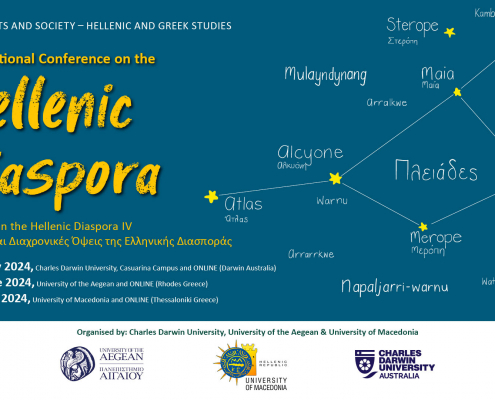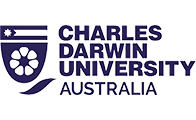Background
 Thoughts for the materialisation of an educational program which has as its objective the teaching of Greek language and culture, and which would promote cross-academic collaboration both in and outside of Greece, came to fruition in 2007 when the first draft of a plan for such a collaborative initiative was signed by the University of the Aegean in Greece, and Charles Darwin University in Australia (CDU, 2016). This was followed one year later at the School of Humanities of the University of the Aegean in Rhodes, by the signing of a memorandum of understanding between these two institutions. The agreement placed at its epicentre the strengthening of collaboration among the educational institutions involved, including the primary goals of promoting new teaching/learning modes, incorporating as core to the initiative, updated technological platforms and tools, and the reinforcement of Greek language education (Damanakis, 2007) in the diaspora.
Thoughts for the materialisation of an educational program which has as its objective the teaching of Greek language and culture, and which would promote cross-academic collaboration both in and outside of Greece, came to fruition in 2007 when the first draft of a plan for such a collaborative initiative was signed by the University of the Aegean in Greece, and Charles Darwin University in Australia (CDU, 2016). This was followed one year later at the School of Humanities of the University of the Aegean in Rhodes, by the signing of a memorandum of understanding between these two institutions. The agreement placed at its epicentre the strengthening of collaboration among the educational institutions involved, including the primary goals of promoting new teaching/learning modes, incorporating as core to the initiative, updated technological platforms and tools, and the reinforcement of Greek language education (Damanakis, 2007) in the diaspora.
In 2014, with a similar orientation and philosophy, a memorandum of understanding was signed with the University of Macedonia in Greece. Within the framework of this agreement were included interdisciplinary collaboration, and an international inaugural conference initiated by Charles Darwin University, and continued at the University of the Aegean and the University of Macedonia (Carment et al., 2019).
The aim of the three conferences (held in 2017, in 2019 and 2022) which were located across the three universities, was the establishment of academic initiatives that included the following main topics: “The Greek Diaspora,” as well as an interchange of ideas about perceptions of Greek language education (Frazis et al., 2019). It is noteworthy that apart from the ongoing assistance from the tertiary institutions primarily involved in improving the quality of the ongoing initiative, was the articulation of contributions to this effort from various potential providers such as Greek and other cultural associations, the inclusion and role(s) of private donors, as well as an articulation of the roles of primary and secondary education providers who embrace the Greek In-Country Study Program (CDU, 2016), and to offer their mentoring services to Charles Darwin University.
As one early outcome, the creation of an active network of colleagues in several universities led to the publication of the first collective/collaborative volume (Carment et al., 2019), the central topic of which was the multi-level activity among the Greek communities in the Northern Territory of Australia, as well as of other centres where the Greek presence has been evident, and remains strong, and has even shown growth as a consequence of the economic crisis that broke out in Greece since 2010 onwards. The publication of the first volume, Perspectives on the Hellenic diaspora (Carment, et al., 2019) was financed by the Government of the Northern Territory and the Charles Darwin Foundation. The second collective volume published in 2021, Perspectives on the Hellenic diaspora Volume 2 (Frazis et al., 2021) was also financed by the Government of the Northern Territory. Its central topic is migration from an interdisciplinary perspective and, as such, it contains studies of the phenomenon of migration through the lens of historical, cultural, community, and ethnographic orientations and methodologies. The third volume of the series Perspectives on the Hellenic Diaspora, includes articles that refer to the Diaspora of Hellenes over time. It is a continuation of the first and second volumes of the series, which has the goal of highlighting diasporic studies across the academic spectrum. This publication offers a smorgasbord of academic papers, in either Greek or English, on various topics relating to Hellenism in the Diaspora, reflecting an actively engaged populace of researchers in the field.
The high-calibre of papers on offer have been organised thematically, constituting six chapters, the first of which is dedicated to the four keynote speakers of the conference. Commencing with the keynote address of His Eminence Archbishop Makarios of Australia, Volume 3 pays its first and due respects to the Greek Orthodox Church in this way. The paper examines the Church’s theological vision and mission activities within Australia, preparing the ground for all other academic pursuits and research that follow in this publication. Voice is then given to University Fellow, Eileen Cummings, who presents the ‘Stolen Generation’ history through the eyes of Indigenous peoples. An Aboriginal woman, academic, and activist for the rights of Indigenous peoples of the Stolen Generation, this paper sets the scene for further intercultural stories that link Australia’s Indigenous peoples to Hellenes and other ethnicities living in Australia. Two eminent Greek academics follow as keynote speakers of the conference – Emeritus Professor George Kanarakis OAM, whose paper is on the diachrony of the Greek language and its contribution to Australian English; and Emeritus Professor Michael Damanakis, who offers and historical approach to the functions of the Greek language in the Diaspora.
With the tone set for this volume, the papers that follow offer much to the reader. In a logical sequence of themes, Chapter Two is dedicated to the histories of the Diaspora, with a focus on Hellenic histories. Once again, paying tribute to the Church, the chapter opens with a paper on the presence of the Greek Orthodox Church in Australia, specifically in Darwin. Thereafter, the chapter offers distinct histories, including some relating to Darwin and the Northern Territory. Chapter Three takes an interesting and important pathway of exploration into the Indigenous viewpoint and experience of the Stolen Generation and other Indigenous experiences of invasion and colonisation. The inter-connectedness of Hellenes with the Indigenous peoples of Australia is a significant thread that runs through these papers. Greek education and culture in the Diaspora are the topic of Chapter Four, wherein we gain an international perspective on how the Greek language and culture are taught in Australia but also in other parts of the world. The pedagogical approaches used today and in previous decades provide fascinating insights that will ring true with teachers and educators alike. Sequentially, Chapter Five is about language, history and culture in the Diaspora. This chapter comprises the highest number of papers and includes research conducted on the histories of the teaching and learning of Modern Greek in various parts of Australia and elsewhere. A major focus of Chapter Five is the use of Information and Communications Technology (ICT) in the classroom. The final chapter of this volume, Chapter Six, is dedicated to the topic of literature in the Diaspora. Here, the lens through which literature is analysed is identity and the diversity that exists within the concept of identity. Various literary works are explored, including translations of Greek literary works into the Serbian language and its impact on Serbian society in general. This chapter explores the very relevant concepts of ‘third space/third place’ and ‘otherness’.
There can be little dispute, therefore, that the research on offer in this collection of papers is varied and relevant in content, and rich in detail pertaining to the meaning of the concept of “Hellenic Diaspora”. Each paper is like a jewel in the crown of diasporic Hellenism, which awaits to be worn by its readers.
4th International conference
The conference will be held both virtually and on Casuarina campus in Darwin, Day 1 (31 May 2024), in the Aegean University, Rhodes in-person and online, Day 2 (29 June 2024) and in the University of Macedonia, Thessaloniki, in-person and online, Day 3 (12 July 2024).
Our goal in this coming conference is:
- To showcase the successful collaboration with the above Universities since 2007, as well as with other universities around the world.
- To bring together (virtually and some of them physically) more than 60 academics around the world and deliver their research.
- To engage in discourse both educational traditions, the Western as well as the First People in Australia. The keynote addresses in all three days of the Conference, as follows:
- By The Honourable John Anictomatis AO, former Administrator of Northern Territory:
Topic: Pioneer Greek migrants through the eyes of a young immigrant. - by Professor Dimitrios Koutsogiannis, Aristotle University:
Topic: Διδασκαλία της ελληνικής στη διασπορά: από τη θεωρία και την έρευνα στη γλωσσική πολιτική. - by Assistant Professor Nikos Vasiliadis, University of Macedonia:
Topic: Η ελληνική γλώσσα ως εργαλείο της ελληνικής πολιτιστικής διπλωματίας»
- By The Honourable John Anictomatis AO, former Administrator of Northern Territory:
- To launch the new book of the series Perspectives on the Hellenic Diaspora, Volume 3, as follows:
- by His Honour Judge Anastasios Liveris in Darwin
- by Professors Vasilia Kourtis-Kazoullis, Marianthi Oikonomakou & George Frazis in Rhodes
- By A/Professor George Frazis and Dr Styliani Letsiou in Thessaloniki.
- To promote the NT around the world as well as the unique character of our three Universities.
Download the poster as a PDF.
